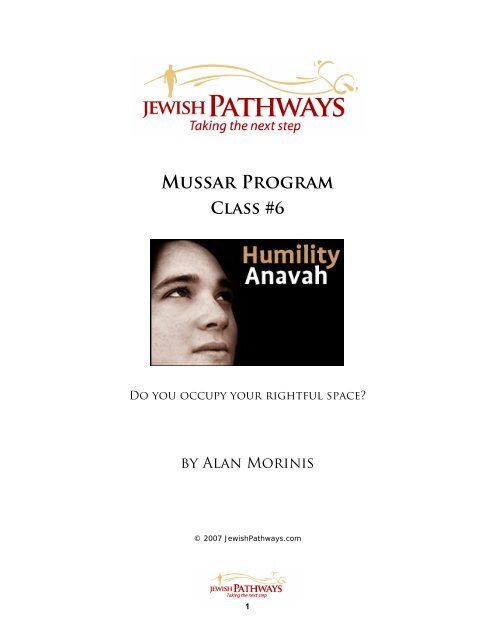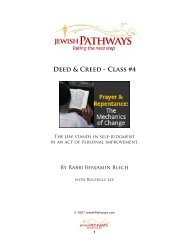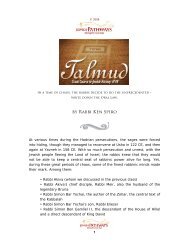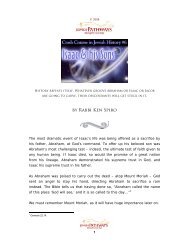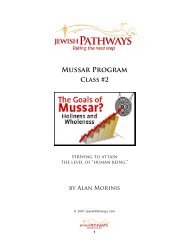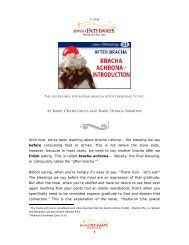You also want an ePaper? Increase the reach of your titles
YUMPU automatically turns print PDFs into web optimized ePapers that Google loves.
Mussar Program<br />
Class #6<br />
Do you occupy your rightful space?<br />
by Alan Morinis<br />
© 2007 <strong>JewishPathways</strong>.<strong>com</strong><br />
1
Mussar provides us with the image of life as a spiritual ladder that we<br />
climb, rung by rung. The rungs of the ladder are the traits of the inner<br />
life – the middot. How you practice generosity and kindness and<br />
forgiveness and honor and truth are all rungs of the ladder.<br />
Now it may be that any one trait is so perfected in you that there is no<br />
climbing necessary. Thank God, we all have some traits like that. For<br />
me, I marvel at people who can be as patient as a rock while waiting<br />
behind someone fumbling at a painfully slow speed. Yes, there are<br />
such people, though I am not one of them.<br />
No matter how good we might be in some areas, however, there are<br />
bound to be other areas of inner being where each of us is not so<br />
whole. In those specific traits you will find your personal spiritual<br />
curriculum.<br />
One rung of the ladder to which the Mussar masters have always paid<br />
special attention is the trait of humility, anavah. Very often they<br />
suggested that this was the place to start the Mussar journey, and we<br />
will follow that advice, too. Their reasoning is not hard to uncover. The<br />
topic of “humility” covers all aspects of where your own sense of ego<br />
figures into your life. We tend to perceive and to relate to our lives<br />
through the lens of the self, and so if there is any distortion in that<br />
lens, then everything else in our lives will appear distorted as well,<br />
whether we realize it or not. This idea is conveyed in the more classic<br />
language of The Duties of the Heart, where we read: “All virtues and<br />
duties are dependent on humility.”<br />
Because this is the first of the 13 middot, this lesson will be a bit<br />
longer than usual, as we need to lay some general guidelines for how<br />
to examine your personal level of the traits, and then how to<br />
implement the practical aspects of the Mussar experience.<br />
I also have a suggestion regarding the pace at which you go through<br />
this course. For the next 13 lessons you should proceed at the rate of<br />
one per week. This will enable you to go through the daily exercises<br />
that are structured into each lesson of the 13 middot.<br />
2
Golden Mean<br />
We’ll get to exploring humility in a moment, but even before we do,<br />
take it as a given that in the eyes of the Mussar masters, the right way<br />
to be humble would not be to see yourself at either extreme of the<br />
spectrum. Following the notion of the “golden mean” that we<br />
encountered in Lesson #3, we should not allow our sense of self to<br />
inflate to the point of conceit or arrogance (ga’avah in Hebrew), nor<br />
should we hold ourselves to be the lowest of the low, so deeply<br />
ensconced in the dust that we could crawl under a worm wearing a top<br />
hat.<br />
Proper humility is so crucial because your perception of any of your<br />
inner traits will be very much affected if you see yourself to be the<br />
king of the world, on one hand, or its most insignificant dreg on the<br />
other. And so, for example, if you were to consider whether you are<br />
being optimally generous in life, or how you practice the trait of<br />
honoring other people, your understanding of those traits will be<br />
refracted through the lens that is your ego. Should there be any<br />
misalignment of ego, that will affect how you see every other trait.<br />
And so for its own sake, as well as to keep all our perceptions straight<br />
and true, it is with humility that we begin.<br />
What is <strong>Humility</strong>?<br />
One of the classic ways to describe the path of Mussar is to cite the<br />
Torah’s injunction to “walk in God’s ways.” When we turn to examine<br />
the soul-trait of humility, “walking in God’s ways” can mean abhorring<br />
arrogance. Tradition uses the strongest language: “All the proud in<br />
heart are an abomination to God” (Proverbs 16:5). And the Talmud<br />
(Sotah 5a) adds in regard to a proud person, “God says ‘I and he<br />
cannot dwell in the same world’.” If we set out to model our behavior<br />
on that of God, then arrogance will be an abomination to us as well.<br />
3
As much as we have to be on guard against arrogance, we should not<br />
fall prey to thinking that pursuing its opposite extreme is the answer,<br />
either. Absence of self-esteem does not represent a spiritual ideal.<br />
Some kinds of pride are necessary for the healthy soul. This idea<br />
corresponds to the essential tenet of Judaism that we are all invested<br />
with a soul that is breathed into us by God. Bearing that level of<br />
worthiness is an honor in which one might well take pride. We get<br />
support for this idea from the Bible, where we read in regard to King<br />
Yehoshafat, “His heart was high in the ways of God” (2-Chronicles<br />
17:6). This is praiseworthy pride.<br />
So in being guided toward healthy humility, we are cautioned to avoid<br />
either extreme that flanks this trait. That’s good practical guidance,<br />
but it doesn’t address a primary question we need to ask, which is:<br />
What exactly is humility?<br />
The word “humility” sounds so much like “humiliation” that it’s easy to<br />
get a very wrong impression. In the traditional Jewish understanding,<br />
humility has nothing to do with being the lowest, most debased,<br />
shrinking creature on Earth. Rabbi Abraham Yitzchak Kook (1864-<br />
1935), first Ashkenazi Chief Rabbi of Israel, says it well:<br />
<strong>Humility</strong> is associated with spiritual perfection. When<br />
humility effects depression, it is defective. When it is<br />
genuine, it inspires joy, courage and inner dignity.<br />
Being humble doesn’t mean being ‘nobody,’ it just means being no<br />
more of a ‘somebody’ than you ought to be. After all, Moses, the<br />
greatest of the prophets, is described in the Torah as “very anav<br />
[humble], more than any other men who were upon the face of the<br />
earth” (Numbers 12:3).<br />
If a leader as great as Moses was so humble, then there is surely more<br />
to humility than the shrinking meekness we ordinarily associate with<br />
the term.<br />
4
A Talmudic Insight<br />
A story in the Talmud helps us begin to get a sense of the distinctively<br />
Jewish understanding of humility. The passage begins: “The anivut<br />
[humility] of Rabbi Zechariah son of Avkulas caused the destruction of<br />
the Temple in Jerusalem” (Gittin 55b-56a). This was a cataclysmic<br />
event in Jewish history that is still mourned today. How could a virtue<br />
like humility cause so terrible a catastrophe?<br />
To understand, we have to enter the story a bit earlier, when a man<br />
named Bar Kamtza sought revenge on the Jewish leaders of<br />
Jerusalem, by going to the Romans to claim that the Jews were<br />
rebelling. To prove his point, he told the Roman leadership to send a<br />
sacrifice to the Temple. Normally such a sacrifice would be offered up,<br />
but Bar Kamtza caused a minor blemish on the animal that was<br />
unnoticeable to the Romans, but which he knew the rabbis would see<br />
and so refuse to accept the offering. This refusal would be “proof” that<br />
the Jews were in rebellion against Rome.<br />
When the sacrifice came before the rabbis in the Temple, they noticed<br />
the hidden blemish, and understood immediately what was going on.<br />
One sage suggested that they offer the sacrifice anyway. Rabbi<br />
Zechariah ben Avkulas, however, argued that if they did so, people<br />
would draw the incorrect conclusion that it was permitted to offer<br />
blemished sacrifices.<br />
The rabbis then suggested that Bar Kamtza be killed to prevent him<br />
from telling the Romans and endangering the Jewish people. Rabbi<br />
Zechariah ben Avkulas responded again, by saying, “If we do so, then<br />
people will incorrectly think that those who inflict blemishes on<br />
sacrifices are put to death.”<br />
As a result of this unwillingness to accept either course of action, Bar<br />
Kamtza succeeded in his plan. The sacrifice was denied, and the<br />
Romans took this as proof of a Jewish rebellion. The Romans attacked<br />
5
and ultimately destroyed Jerusalem and the Temple. The Talmud<br />
concludes: “The anivut of Rabbi Zechariah ben Avkulas caused the loss<br />
of our home, the burning of our sanctuary, and our exile from the<br />
land.”<br />
What can we learn of the Jewish concept of humility from the story of<br />
Zechariah ben Avkulas?<br />
Rabbi Zechariah showed humility because he did not act with<br />
presumption – either by offering a blemished animal that contravened<br />
the rules, or by condoning murder. But he actually manifested too<br />
much humility in shrinking from the task at hand. He held the fate of<br />
the Temple and his people in his hands, yet he seems to say, “Who am<br />
I to make such unprecedented decisions that will potentially mislead<br />
the people as to the law?” This was his excessive humility. His sense of<br />
self was flawed because he saw himself as less capable of solving a<br />
real-life dilemma of great consequence than he actually was. For<br />
surely if God sent the challenge, Rabbi Zechariah had the capability to<br />
handle it.<br />
To clarify the picture even more, let’s add another enigmatic reflection<br />
on humility from the Talmud:<br />
Anyone who sets a particular place for himself to pray in the<br />
synagogue, the God of Abraham stands in his aid, and when he<br />
dies, people say of him, ”This was a humble person.” (Brachot<br />
6b)<br />
Where is the humility in sitting in the same place in the synagogue<br />
whenever you <strong>com</strong>e to pray? The answer is that by fixing yourself to<br />
one spot, you thereby free up all the other space for others.<br />
This example helps us frame a Jewish definition of humility as<br />
“limiting oneself to an appropriate amount of space, while<br />
leaving room for others.” Sitting in a predictable place, you make<br />
room for others to occupy their own spaces, too. In considering that<br />
the space a person can occupy can be physical, emotional, verbal, or<br />
6
even metaphorical, it appears that Rabbi Zechariah ben Avkulas gave<br />
up too much of his “space.”<br />
This definition also fits Maimonides’ concept that humility is not the<br />
opposite of conceit, which would be self-effacement, but rather stands<br />
between conceit and self-effacement. <strong>Humility</strong> is not an extreme<br />
quality, but a balanced, moderate, accurate understanding of where<br />
you actually fit in life. That’s why humility and self-esteem go hand-inhand.<br />
When you understand humility in terms of the space you occupy, it’s<br />
important to clarify that we are not all meant to occupy the same<br />
amount of space. Some people appropriately occupy a lot of space, as<br />
would be the case with a leader – think of Moses again. But if a leader<br />
laid claim to even more space than was appropriate, they would be the<br />
wicked Pharaoh, who defined himself as a deity. And we have already<br />
learned from the case of Rabbi Zechariah ben Avkulas that for a leader<br />
to shrink from his responsibilities – to take up less space than<br />
appropriate – can have disastrous consequences.<br />
At the other end, it may be entirely appropriate for a more solitary<br />
person to occupy less than an average volume of space. Were a<br />
person of this nature to force themselves to speak up more, be more<br />
outgoing, etc. – in other words, to fill more space – the soulconsequences<br />
could be negative. Nor would it serve the soul to<br />
withdraw even further from what is already suitable.<br />
Think about some everyday scenario that you encounter. Perhaps at<br />
your weekly staff meeting at work, there is one person who is always<br />
more assertive than his position would call for. The possible scenarios<br />
are endless, but thinking about some genuine ones will help you bridge<br />
the gap from the theoretical to the practical.<br />
7
First Trait<br />
The Mussar teachers stress that anavah is the first soul-trait to work<br />
on, because humility entails an unvarnished and honest assessment of<br />
your strengths and weaknesses. Without humility, either you will be so<br />
puffed up with arrogance that you won’t even see what really needs<br />
work, or you will be so deflated and lacking in self-esteem that you will<br />
despair of being able to make the necessary changes.<br />
Recalling that the word middah means "measure," I invite you to ask<br />
yourself, what is the measure of your humility? Your answer can and<br />
should be framed in terms of space. Do you occupy your rightful<br />
space?<br />
The graph of the quality looks like this:<br />
Not everyone needs to develop humility. Some people are already too<br />
humble. In order to be<strong>com</strong>e more whole, one person needs to cultivate<br />
humility and another needs to enhance pride. We are strongly warned<br />
against arrogance, but Mussar encourages self-confidence and selfesteem.<br />
In Psalms 93, God is described as: “Hashem malach geyut<br />
lavesh” – “God will have donned grandeur,” providing us with a term<br />
to name the positive counterpart to arrogance – geyut.<br />
And it is also true that one’s sense of self is contextual. A person who<br />
acts arrogantly with his immediate family may be meek and<br />
submissive in his place of work. Rabbi Simcha Bunim of Pschishe used<br />
8
to carry two notes in his pockets, so that he could reach in to fetch out<br />
one or the other, depending on the need. One said “For my sake was<br />
the world created” (Mishnah - Sanhedrin 4:5). The other had the<br />
words: “I am dust and ashes” (Genesis 18:27).<br />
If you are a person who seeks to be<strong>com</strong>e more humble, an exercise<br />
for you to practice is to take on the acts of a humble person.<br />
What does this entail? We learn from the Ramchal (Rabbi Moshe<br />
Chaim Luzzatto) that to cultivate humility, you can try “sitting in a less<br />
than auspicious place, walking at the back of a <strong>com</strong>pany of people,<br />
and dressing in modest clothing.”<br />
These are not just illustrations; these are assignments for you to<br />
practice. Pick one of the foregoing and <strong>com</strong>mit to practicing it over<br />
the next week. Will you dress in a less eye-catching fashion? Or speak<br />
less than you normally do? Or seat yourself at the back of the room,<br />
rather than the front where you are inclined to sit? Choose an activity<br />
that will give you a sense of being smaller than you usually seek to be,<br />
and try that out in practice.<br />
But if, on the other hand, you are a person who is already too meek<br />
and retracting, the trait to practice is geyut [grandeur]. Perhaps take a<br />
cue from the Mussar school of Slabodka, whose students dress very<br />
well, in clean and well-presented clothing (which, by the way, does not<br />
necessarily mean more expensively, but more thoughtfully put<br />
together), and carry themselves with great dignity. Improve your<br />
posture when standing and sitting, eat with fine manners, and speak<br />
with clear diction and good grammar.<br />
Again, these points are listed not for theoretical, but for practical<br />
purposes. Choose one of the suggested behaviors and <strong>com</strong>mit to it for<br />
a week. To achieve this, you will need to recite your key phrase as a<br />
morning affirmation, and than every evening record your observations<br />
in your Accounting of the Soul Diary. Consistency is the key. We want<br />
to change, to shake off those habits and behaviors which are getting<br />
us down. To do so requires genuine effort.<br />
9
Practicing in these ways requires that you first be aware of where on<br />
the spectrum of ego you tend to be located. Then, if you see that it is<br />
desirable to move yourself to the left or to the right, act the part<br />
because, as Rabbi Luzzatto says, “The only way anything like it can be<br />
ac<strong>com</strong>plished is by taking control of the external actions that are<br />
available to you. Thus you can slowly affect the internality of it, which<br />
you do not have as much control over.” You will see the effect in your<br />
own experience, which is and the most convincing lesson of all.<br />
In summary, you will need:<br />
• A morning affirmation / key-phrase<br />
• A specific kabbalah-point to work on<br />
• An evening session with your Accounting of the Soul Diary,<br />
and a built-in reminder system<br />
10


